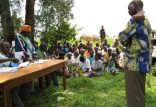Recovery in Rwanda – traditional courts for reconciliation
TransConflict
Posted on May 28th, 2012 in the category GCCT by TransConflict
 Gacaca Courts – local courts based upon communitarian values - were recoveredfrom previous traditions by the post-genocide government; focusing not necessarily on punishment, but first and foremost on forgiveness and reconciliation.
Gacaca Courts – local courts based upon communitarian values - were recoveredfrom previous traditions by the post-genocide government; focusing not necessarily on punishment, but first and foremost on forgiveness and reconciliation.
By Moara Crivelente
The ethnic aspect which is usually defined as a cause of conflict between Hutus and Tutsis – either historically fundamented or discursively constructed, and instrumentalized by political leaders – has deep roots with which society has to deal. To initiate this process, Gacaca Courts - local courts based on communitarian values - were recovered from previous traditions by the post-genocide government; focusing not necessarily on punishment, but first and foremost on forgiveness and reconciliation. This process is important due to Rwanda’s reconstruction of economic and, more importantly, social structures.
Nonetheless, a contraposition between peace and justice is constantly made; mostly by critics who do not consider Gacaca’s objectives as actual justice, or as effective enough in facilitating the building of peace. Bearing in mind its subjectivity, the concept of justice will be referred to throughout as an endeavour to secure accountability and punishment - either to remove criminals from society or to protect society from criminals – only for the sake of simplicity and correspondence with the critics referred to below.
As communitarian and traditional courts, the Gacacas are said to be the best way found by the Rwanda to deal autonomously with their problems, through their own methods. The courts were introduced as a combination of some sort of truth commissions (1) and other programs aimed at promoting forgiveness and reconciliation; essential for pursuing justice and laying the basis for the reconstruction of the Rwandan society. The proceedings are focused on social-healing workshops (2) also organized by the Government, with special attention given to risk groups, such as children orphaned by genocide. Justice and the construction of memory should serve for preventing and dismantling mechanisms that allow violence, thereby ensuring the tragedy does not repeat itself (3).
According to a 1997 report by the UN Sub-Commission on the Promotion and the Protection of Human Rights, the number of imprisoned people suspected of grave human rights violation was so high that it was almost impossible to try them fairly, within a reasonable period of time. In that sense, the Rwandan case is exemplary: more than 90,000 persons were imprisoned then – the majority of them charged with crimes of genocide – and the judiciary could not deal with the situation in a sufficiently effective manner (4). In that sense, establishing the Gacaca Courts’ jurisdiction – in 2001, for crimes against humanity committed between October 1990 and December 1994 – contributed not only to efforts at reconciliation and justice in a traditional and local manner (5), but also for more efficiency. The Gacacas’ goals are to tell the truth about the genocide, actively engaging the local population in its hearings; to speed up the genocide trials, increasing the judicial system’s institutional capacities; to eliminate the culture of impunity; to promote reconciliation and unity between the Rwandan people; and to demonstrate how Rwanda can deal with its own problems through a judiciary system based upon its own traditions, despite adaptations made to fit some international standards.
The proceedings and psychological impacts Full Story>>>

